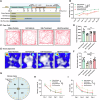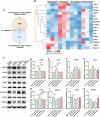Oral antioxidant edaravone protects against cognitive deficits induced by chronic hypobaric hypoxia at high altitudes
- PMID: 39362869
- PMCID: PMC11450176
- DOI: 10.1038/s41398-024-03133-1
Oral antioxidant edaravone protects against cognitive deficits induced by chronic hypobaric hypoxia at high altitudes
Abstract
Chronic hypobaric hypoxia at high altitudes can impair cognitive functions, especially causing deficits in learning and memory, which require therapeutic intervention. Here, we showed that mice subjected to hypobaric hypoxia (simulating an altitude of 5000 m) for one month experienced significant cognitive impairment, accompanied by increased biomarker levels of oxidative stress in the brain and blood. Oral administration of a novel formulation of edaravone, a free radical scavenger approved for the treatment of ischaemic stroke and amyotrophic lateral sclerosis, significantly alleviated oxidative stress and cognitive impairments caused by chronic hypobaric hypoxia. Furthermore, oral edaravone treatment also mitigated neuroinflammation and restored hippocampal neural stem cell exhaustion. Additionally, periostin (Postn) is vital in the cognitive deficits caused by chronic hypobaric hypoxia and may be a molecular target of edaravone. In conclusion, our results suggest that oxidative stress plays a crucial role in the cognitive deficits caused by chronic hypobaric hypoxia and that oral edaravone is a potential medicine for protecting against cognitive deficits caused by chronic hypobaric hypoxia in high-altitude areas.
© 2024. The Author(s).
Conflict of interest statement
The patent application for edaravone in the prevention and treatment of cognitive impairment induced by chronic hypobaric hypoxia is currently being prepared, Daping Hospital and Suzhou Auzone Biotech are the patent owners, and Yan-Jiang Wang, Yuan-Yuan Ma and Xin-Fu Zhou are the patent inventors. Xin-Fu Zhou is an employee of Suzhou Auzone Biotech. Other authors declare no competing interests.
Figures






References
Publication types
MeSH terms
Substances
Grants and funding
LinkOut - more resources
Full Text Sources
Miscellaneous

